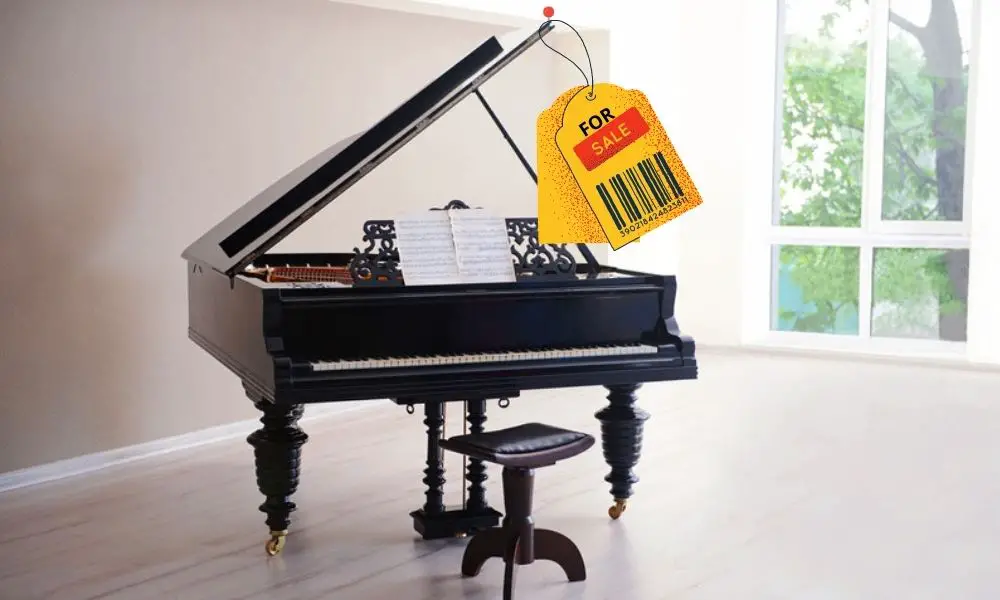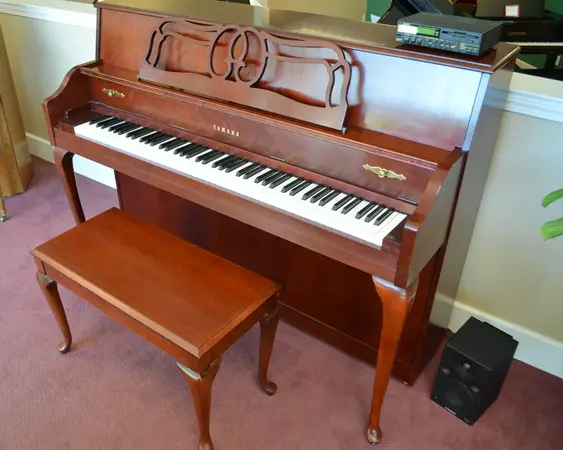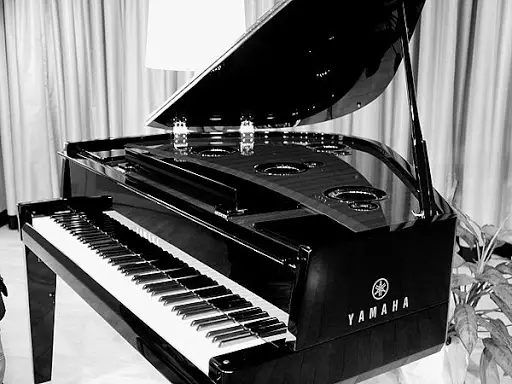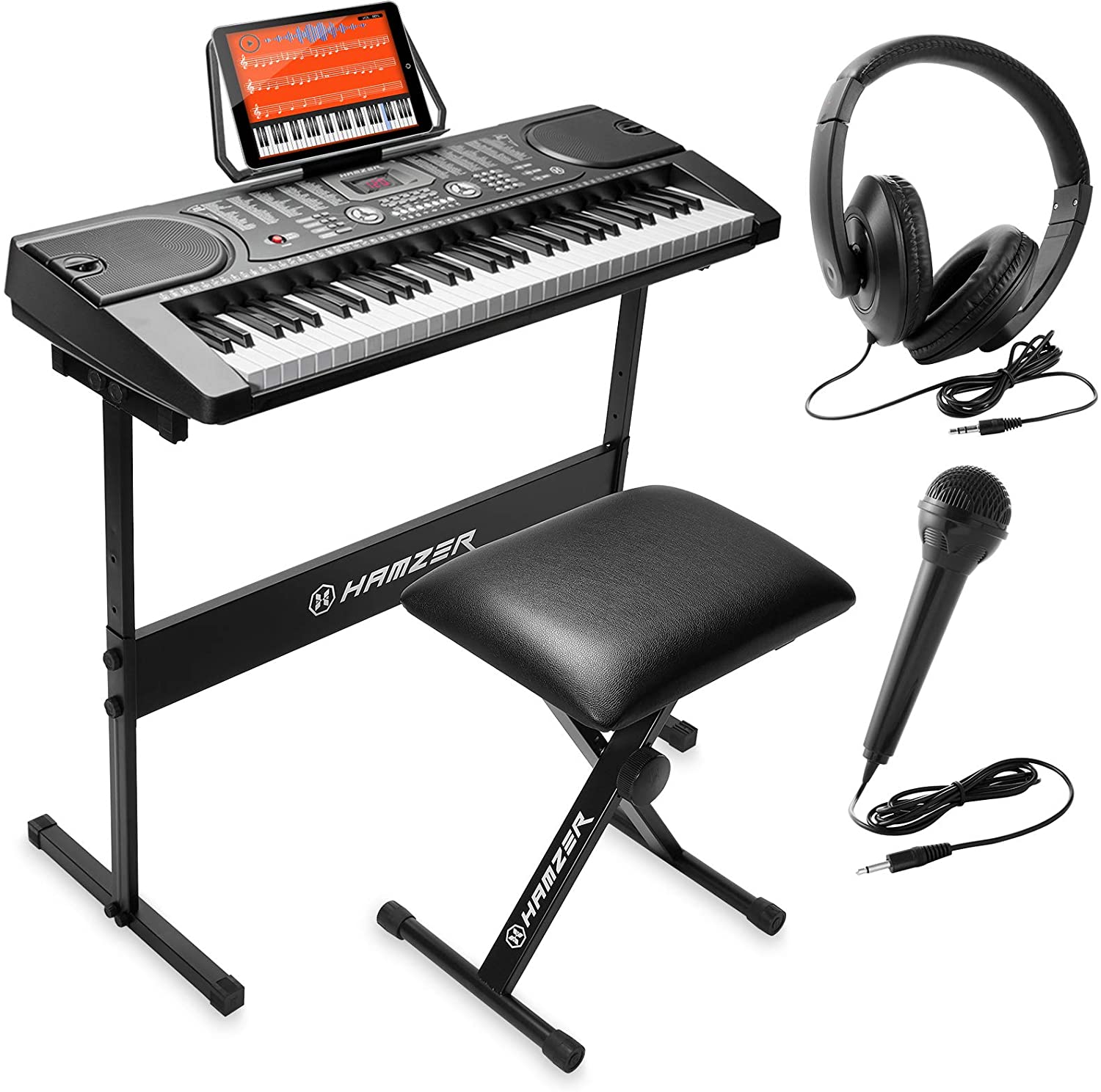
There comes a time in every piano owner’s life where they must sell their piano.
With new and improved pianos coming into the market daily, it’s tempting to get your hands on a better one.
Selling your current piano is an excellent way to fund a new one.
But how to sell a piano effectively?
Luckily, there are simple processes that go into this endeavor.
Keep reading, and I’ll tell you everything you need to know about selling your piano.
Quick NavigationThings To Do Before Selling a PianoGet The Piano TunedTaking PicturesPreparing For QuestionsDetermining The Piano’s ValueWho Can You Sell To?Additional Tips For Selling Your PianoHow To Determine If It’s Worth SellingSelling a Digital Piano or KeyboardConclusion
Things To Do Before Selling a Piano

To get the most money back for your piano, you have to do some things first. Here are some of them:
- Prep the piano
- Take appealing pictures
- Prepare for questions
- Figure out its worth
Prepping a piano consists of several things. Before putting it on the market, it’s essential to clean it as best as possible.
Start out by removing all the dust on the inside and outside. In time, the keys can develop lots of dust and dirt, which is hard to remove. The safest way to get it off is with a damp cotton cloth. However, you can also use a damp paper towel at your own risk. Most of the time, a wet paper towel will do the trick. On the other hand, I wouldn’t recommend this material if your keytops are fragile.
If you have anything sitting on the piano, be sure to take it off. Buyers are interested in the piano, but not what’s on top of it.
Get The Piano Tuned

Another important prepping aspect is tuning. Before anyone comes to your house to try out the instrument, it should sound as good as possible. Virtually nobody buys a piano without testing it out first. A $100 tuning job could be the difference between selling your piano and not. It also indicates to the buyer that you’ve maintained it well.
Taking Pictures
When your piano is in ship shape, it’s time to take some pictures. Before doing this, you should take this one guideline to heart: Avoid taking blurry or dimly lit pictures. Try to imagine that you’re the buyer for a moment. Only use the photos that would spike your own interest if you were looking for a piano. Make sure that the photo quality is high and there’s plenty of light.
Preparing For Questions
Anyone interested in your piano will most likely have some questions. Here is a list of questions they might ask:
- How old is the piano?
- What is it’s service history?
- What is its current condition?
- What are the keys made of?
- What model is it?
If you don’t already know the answer to these, it’s in your best interest to figure them out. The more knowledge you have about it, the easier you’ll get it out of your hands. Customers feel much more comfortable buying from a knowledgeable owner than a clueless one.
Determining The Piano’s Value

Here are a list of factors that affect a piano’s cost:
- Brand
- Soundboard
- Age
- Labor costs
- Pin block
Accurately determining your piano’s value can make or break your selling success. You might wonder, does a piano’s price increase with age? The answer to this question is no. However, there are some exceptions, like vintage Steinways, Yamahas, and Bosendorfers.
But, in general, people don’t buy pianos as a piece of furniture. 99% of the time, a piano’s value is proportionate to its playability and sound quality.
Start by searching for your model online. You might find one that’s privately listed or being sold by a dealer. Doing this can significantly help you price your piano. But, not everyone is fortunate enough to find their model on the internet.
Some piano models seem to have no virtual footprint. If that’s the case, it might not be worth as much as you wish. If you confidently believe that it’s worth something, you might benefit from getting it appraised. Piano dealers are the best at this.
Something else that plays into the value is the pin block. This piece is what holds all of the tuning pins. Pianos with robust, high-quality pin blocks stay in tune for a much longer time. Many older pianos have worn pin blocks, which lowers their overall value. Replacing these blocks is a challenging and expensive process, as well. If you have an excellent quality pin block, your piano’s value will increase.
Who Can You Sell To?

You can sell a piano privately or to a dealer. A dealer is the quickest option you have. If your piano has some worth, they’ll likely take it off your hands. The only downside to this option is the money return. A dealer might not give you as much as a private buyer. This lower selling price is the price to pay for getting rid of it quickly.
If you want the most money out of your piano, you should try to sell it privately. There’s a price to pay with this option as well, and it’s the time. It might take much longer to find someone interested in your piano.
To give yourself the best chances, you should list the piano on every selling website you can. Some of them include eBay, Craigslist, OfferUp, Facebook Marketplace, etc. If all else fails, you can always sell it to a dealer to get it off your hands.
Additional Tips For Selling Your Piano

An overlooked aspect of selling pianos is the room they’re presented in. If the room is cluttered or messy, you should clean it up before potential buyers look at it. Though this aspect is nutty-gritty, it actually makes a difference. Many subconscious thought processes go through people’s minds when determining if they like something. A cluttered room could turn a potential buyer off before they even look at the piano.
Another beneficial thing you can do is create fliers. Make a list of gathering places where you could put them up. Churches are an excellent place because they often need new pianos.
Figure out a plan for getting it out of your house. Since pianos are heavy hunks, you definitely need to know how to move them. Buyers will also enjoy it if you have a moving plan. To move a piano, all you need is a small 4-wheel dolly. Uprights and grands have very similar moving methods. The most significant difference is the added weight of grands. You’ll likely need many people to help tip it onto the dolly. The last thing you want is for it to break before it gets out of your door.
How To Determine If It’s Worth Selling
The biggest question is, should you put effort into selling it, or should you just get rid of it? Both choices are appropriate for different scenarios. Look no further than the piano’s brand. Is it a well-known or lesser-known brand? If it’s a cheaper Asian brand, it might not be worth very much. However, if you have a Fazioli, Yamaha, Or Steinway, it’s almost certainly valuable.
Another factor is the condition of the piano. There comes a time when a piano’s issues and malfunctions outweigh its actual cost. However, don’t confuse poor shape with being out-of-tune. Many times, people incorrectly attribute out-of-tunedness to poor condition. With a $100 tuning service, the piano might sound great.
Some things to look out for are broken strings, damaged keys, scratches, and other broken parts. Even if some strings are broken, it still might be worth it to get them repaired and sell it. Minor repairs are cheap and can go a long way to help you sell your piano.
Before you sell it, assess its sentimental value. Many people keep pianos in memory of loved ones or happy times. If you’re torn between selling and keeping it, you might just keep it. Selling it could lead to regret, and by then, it’s too late.
Selling a Digital Piano or Keyboard


Digital pianos and keyboards can usually sell for 50% to 80% of the original value. Similar to acoustic pianos, digital pianos can be sold privately or to a dealer. You should prep Keyboards and digital pianos in the same way as real pianos. Since they’re much smaller, the prepping processes are simpler. Electronic pianos are constantly improving, so you could even trade it in for a new one. The top brands are Yamaha, Casio, Korg, Roland, and Nord. Since digital pianos and keyboards are in high demand, you should have no trouble selling yours at a reasonable price.
Conclusion
Selling a piano can be a difficult process if you don’t take the right steps. Luckily, there are plenty of things you can do to make it easier. Figuring out the piano’s value is the first thing to do. After that, it’s time to prep it, and it takes a series of high-quality pictures to post on selling websites.
If you don’t have the patience to sell it privately, there’s always an option to sell it to a dealer quickly. Regardless of who you sell it to, it’s excellent to learn more about it. The process will be much simpler if you can showcase confidence and knowledge to potential buyers.
If the piano doesn’t sound great, it could just be a lack of tuning. Before selling it, you should always get it tuned beforehand. It’s extremely rare for buyers to take a piano without trying it out. Though it’s inconvenient to spend an extra $100, it can be the difference between selling and dumping it.
If you sell it privately, be sure to put it on every selling website you can. The more people that see it, the better your chances will be. To go the extra mile, you can even print out posters to put in churches and other gathering places. If you follow these guidelines to sell a piano, you’ll have the best chances of success.

